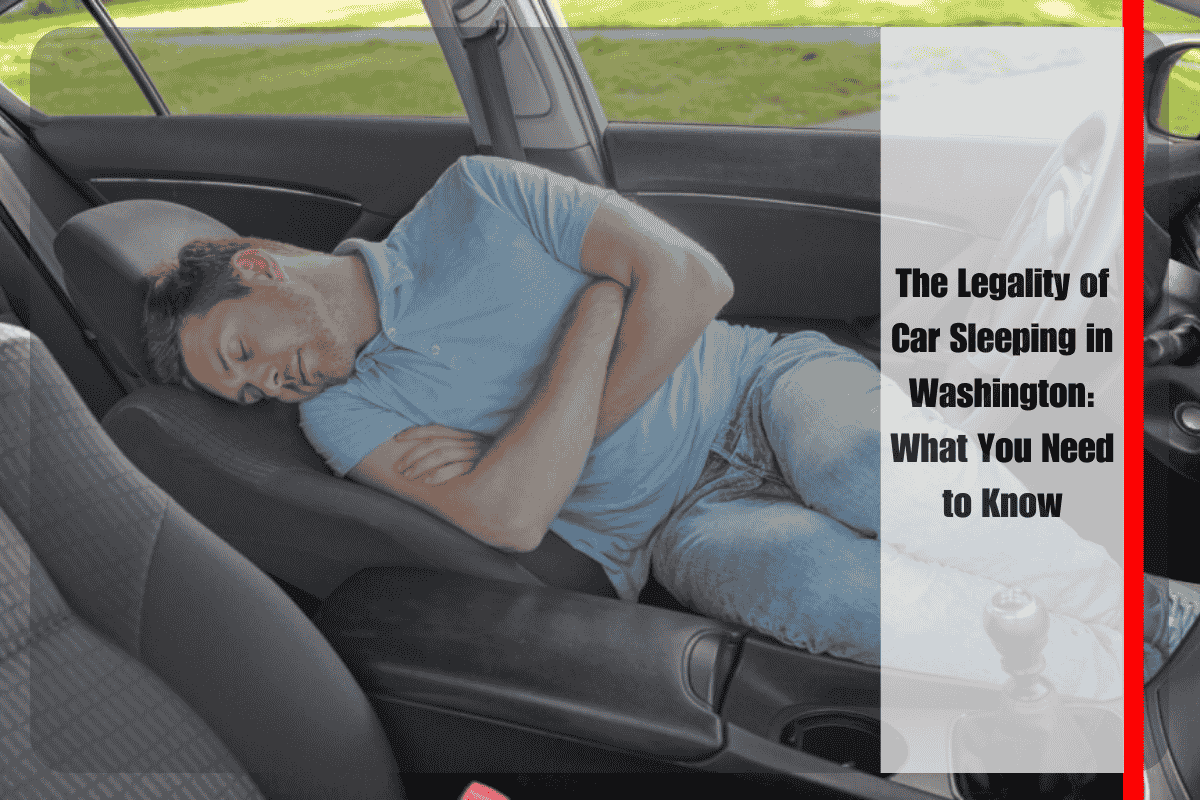Sleeping in your car may seem like a practical solution when you’re traveling, in between homes, or need a temporary place to rest. However, if you’re considering car sleeping in Washington, it’s important to understand the legalities involved. Whether you’re in a city or rural area, there are laws and regulations that could impact your ability to sleep in your vehicle, so it’s crucial to be aware of the rules before parking for the night.
Is It Legal to Sleep in Your Car in Washington State?
In Washington state, there are no state laws that outright ban sleeping in your car, but local laws and regulations vary widely depending on the city or county. This means that while it might be acceptable in some areas, in others, you could face fines or even be asked to leave.
Most cities, especially larger ones like Seattle, Tacoma, and Spokane, have specific ordinances that govern car camping or overnight parking. These rules are often intended to address concerns about public safety, homelessness, and the environmental impact of people living in vehicles. In some areas, sleeping in your car may be prohibited in public spaces, parking lots, or near residential areas.
Parking Restrictions and City Ordinances
In Washington’s larger cities, parking enforcement is generally strict, particularly in areas with heavy pedestrian or vehicle traffic. Seattle, for example, has numerous laws restricting overnight parking, and sleeping in your car is not allowed on public streets or in certain commercial areas. However, there are exceptions, such as designated rest areas, some truck stops, and private properties where permission has been granted.
Many cities in Washington, such as Olympia, allow sleeping in your car in certain designated parking areas with the owner’s permission, but this is typically limited to specific times or locations. Rest areas along highways are often available for short-term parking and may allow for sleeping, but you’ll need to be aware of the time limits and any regulations posted.
Washington’s Homelessness and Vehicle Residency Laws
With homelessness being a growing concern across the U.S., some cities in Washington have created designated areas for individuals to sleep in their cars legally, often referred to as “safe parking” programs. These programs are typically run by non-profits or city governments and allow individuals experiencing homelessness to park and sleep safely overnight in designated areas. Such programs offer a level of protection for both the car occupants and the community, as they often include monitoring and support services.
These programs are often intended for people who do not have access to stable housing and provide safe spaces where they can sleep without fear of fines or harassment. However, participation in these programs usually requires registration, and spaces are limited, so it’s essential to contact local agencies for availability.
How to Legally Sleep in Your Car in Washington
If you’re traveling or need a temporary place to sleep, here are some tips to avoid legal issues:
Use designated rest areas: Washington state has rest areas along highways where you can park overnight. These areas generally allow overnight parking for up to 8-12 hours.
Seek private property: Always ask for permission if you plan to park overnight in a private lot, such as a store or shopping center. Some businesses may allow overnight parking for RVs or cars if you speak with the management first.
Check local ordinances: Each city may have different laws, so it’s important to check local parking and sleeping regulations before deciding where to park for the night.
Utilize safe parking programs: If you are experiencing homelessness, look for safe parking programs that may offer you a designated space to park and sleep overnight.
Potential Consequences of Illegal Car Sleeping
Sleeping in your car illegally in Washington can result in several consequences, depending on the city and local enforcement. In areas where sleeping in your vehicle is prohibited, you may be subject to fines, towing, or having to move to another location. In extreme cases, repeated violations could result in legal action. Additionally, sleeping in unsafe or illegal areas can expose you to other risks, such as theft, harassment, or being asked to leave by law enforcement.
The legality of sleeping in your car depends largely on the location and local ordinances. While some areas allow it under certain conditions, many cities have laws restricting car camping. If you plan on sleeping in your car, make sure to research the specific laws in the area and, when possible, seek out designated parking areas or programs that allow overnight stays. By following the rules and being aware of your surroundings, you can rest safely while avoiding legal trouble.
Sources
[1] https://www.thezebra.com/resources/car-insurance/is-it-illegal-to-sleep-in-your-car/
[2] https://kezj.com/what-is-the-law-for-sleeping-in-your-car-in-idaho-and-washington/
[3] https://www.boondockersbible.com/learn/washington-state-rest-area-rules/
[4] https://newstalkkit.com/is-it-legal-to-sleep-in-your-car-in-wa-state/
[5] https://kw3.com/ixp/113/p/is-it-legal-to-sleep-in-your-car-in-wa-state/












